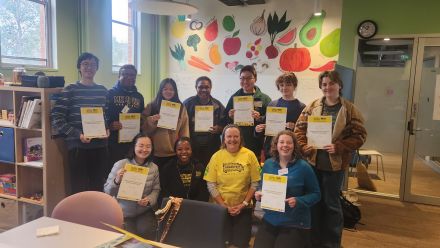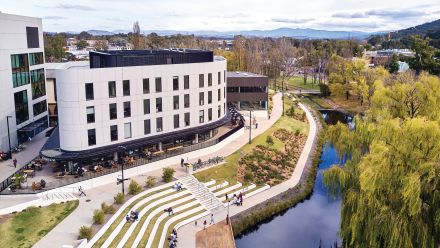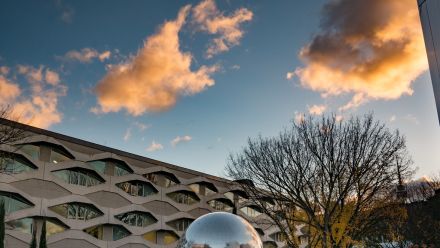It takes a village to keep us safe
Message from our Public Health Lead, Professor Tracy Smart on Thursday 25 March.
Over the past few weeks, as things have become 'COVID Normal' in the ACT and students have returned to our campuses, it may seem that the COVID-safe guidelines that inform how we live and work on campus are becoming a bit outdated. We agree with you. The guidelines, which were written in 2020 to return us to campus, have now been rewritten to reflect the changed situation in which we now find ourselves in 2021. In our revision, we used an evidence and principles-based approach, and have moved away from rules and regulations.
The original University COVID-19 Guidelines were written for a very different phase of the pandemic. At that time the key imperative was to open up the campus is a safe manner, very much guided by the restrictions that were then in place. Looking back, the rules seem very conservative, and this was deliberate. Don't forget that not only did we have local cases popping up in most jurisdictions but there was still a lot we didn't know about this disease. At that time, it was thought that the SARS-CoV-2 virus was most likely spread via droplets, and that most people would catch it from surfaces. This explains why washing our hands, cleaning surfaces regularly and avoiding touching of surfaces were key messages, as well as the 1.5M social distancing. This was especially important in our student residences, probably our biggest area of risk at the Acton Campus, and we worked closely with ACT Health to ensure that we had an approach that allowed us to keep operating the Residences in as safe a way as possible.
Now we know a lot more about the disease. In particular we know that that very little spread has been via touching surfaces, and that aerosol spread is probably the most important mode of transmission. This, and the fact that the risk of developing COVID-19 in the ACT and many other parts of Australia has remained low for many months, has completely changed our understanding and approach to COVID-safety.
Since the COVID Response Office was set up in August 2020, we have continually monitored the COVID-19 situation throughout Australia and modified our approach to COVID-safety accordingly. This has meant continual changes to things like our travel guidance, the Function on Campus protocols, and our capacity limits for rooms and spaces for both teaching and office areas. At every step of the way, we have sought guidance from ACT Health and have kept in lock step with their Public Health Directions. For example, in early December after the roll out of the Check in CBR app ACT Health changed its rules about capacities in non-ticketed indoor venues to 1 person per 2 metres squared. ANU changed our maximum capacity to this standard at that time and, although some of our Semester 1 timetabling was already locked in at 50% capacity by then, these more flexible limits remain in place. We have since further modified our documentation as the ACT moved to 'COVID Normal', and we are looking at making even further changes to capacity limits as we plan for Semester 2.
Although our University COVID-19 Guidelines were not updated due to the fluid nature of the situation in late 2020 and early 2021 this is now being addressed. In recent weeks we have undertaken a complete overhaul of these Guidelines, and a new more streamlined version (cut down to 7 pages from over 30) will be out by the end of the month. The two key takeaways of the new guidelines, and the keys to getting our ANU Community through to the end of the pandemic, are common sense (aka being 'COVID Smart') and individual responsibility. In other words, the approach to keeping us safe is relatively simple but relies on everyone doing their part to protect their own health and the health of others. This is the essence of public health and if we can all trust each other to behave in this way, it will be far more effective than rigid rules and regulations.
I've written previously on what I call the 'COVID-5' - five simple behaviours that we must all adopt as second nature. These need to become your mantra. They are easy to do, and the first three are behaviours we should continue to do even when the pandemic is over.
- Hygiene 101 - frequently wash or sanitise your hands, cover your coughs and sneezes, and clean up your immediate area after you've been there.
- Keep your distance - keep a safe distance from others where you can, particularly when indoors, and avoid crowded spaces. If you can't consider wearing a mask or face covering, particularly if there are local COVID cases in the community.
- Stay home if unwell. Don't bring your cold or 'flu to work or classes - stay home and get tested.
- Check in. Use the Check in CBR QR code to help with contact tracing.
- Keep up to date. Monitor the situation and keep up to date with your local jurisdictional health advice and the Campus Alert System risk level.
You could add a sixth to this for 2021 - get the vaccine when you can.
Most importantly, whatever you are doing, think about the risk to yourself and others around you. If you are young and healthy, then your risk of developing severe COVID-19 is likely to be very low, but not completely zero. It is also likely that you are regularly interacting with someone either in the ANU community or your family and friends who is at higher risk, either due to pre-existing health conditions or age. So even if you don't care about protecting yourself, do the COVID-5 to protect them and keep our community safe.
Moving to this new risk-based approach very much relies on us trusting each other to do the right thing and reinforcing safe behaviours while calling out unsafe ones. Some may think this is a bold move and feel more comfortable with the old approach. My view is that if rules are not based on good evidence and common sense, or indeed on the norms of the broader community, then the rules will either be broken, or people will find a loophole. While lots has changed in the past 12 to 18 months, one thing has remained consistent throughout this difficult time: the ANU Community has demonstrated its unwavering commitment to keeping each other safe and supported. Continuing to do this will allow us to keep moving towards a COVID-19 free future.


